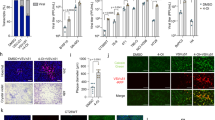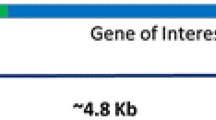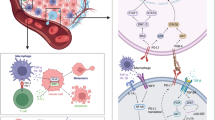Abstract
Background
Viral oncolytic therapy, which seeks to exploit the use of live viruses to treat cancer, has shown promise in the treatment of cancers resistant to conventional anticancer therapies. Among the most difficult to treat cancers is advanced pancreatic adenocarcinoma. Our study investigates the ability of a novel oncolytic agent, myxoma virus, to infect, productively replicate in, and kill human pancreatic cancer cells in vitro.
Methods
The myxoma virus vMyxgfp was tested against a panel of human pancreatic adenocarcinoma cell lines. Infectivity, viral proliferation, and tumor cell kill were assessed.
Results
Infection of tumor cells was assessed by expression of the marker gene enhanced green fluorescent protein (e-GFP). vMyxgfp had the ability to infect all pancreatic cancer cell lines tested. Killing of tumor cells varied among the 6 cell lines tested, ranging from >90% cell kill at 7 days for the most sensitive Panc-1 cells, to 39% in the most resistant cell line Capan-2. Sensitivity correlated to replication of virus, and was found to maximally exhibit a four-log increase in foci-forming units for the most sensitive Panc-1 cells within 72 h.
Conclusion
Our study demonstrates for the first time the ability of the myxoma virus to productively infect, replicate in, and lyse human pancreatic adenocarcinoma cells in vitro. These data encourage further investigation of this virus, which is pathogenic only in rabbits, for treatment of this nearly uniformly fatal cancer.




Similar content being viewed by others
References
Jemal A et al. Cancer statistics. CA Cancer J Clin 2007; 57:43–66.
Lillemoe KD. Current management of pancreatic carcinoma. Ann Surg 1995; 221:133–48.
Spanknebel K, Conlon KC. Advances in the surgical management of pancreatic cancer. Cancer J 2001; 7:312–23.
Bondar VM, Sweeney-Gotsch B, Andreeff M et al. Inhibition of the phosphatidylinositol 3’-kinase-AKT pathway induces apoptosis in pancreatic carcinoma cells in vitro and in vivo. Mol Cancer Ther 2002; 1:989–97.
Pham NA, Tsao MS, Cao P et al. Dissociation of gemcitabine sensitivity and protein kinase B signaling in pancreatic ductal adenocarcinoma models. Pancreas 2007; 35:e16–26.
Woo Y, Adusumilli PS, Fong Y. Advances in oncolytic viral therapy. Curr Opin Investig Drugs 2006; 7:549–59.
Bell JC, Lichty B, Stojdl D. Getting oncolytic virus therapies off the ground. Cancer Cell 2003; 4:7–11.
Lin E, Nemunaitis J. Oncolytic viral therapies. Cancer Gene Ther 2004; 11:643–64.
Stiles BM et al. The replication-competent oncolytic herpes simplex mutant virus NV1066 is effective in the treatment of esophageal cancer. Surgery 2003;134:357–64.
Stanziale SF, Fong Y. Novel approaches to cancer therapy using oncolytic viruses. Curr Mol Med 2003; 3:61–71.
Kooby DA et al. Oncolytic viral therapy for human colorectal cancer and liver metastases using a multi-mutated herpes simplex virus type-1 (G207). FASEB J 1999; 13:1325–34.
Stanford MM, Werden SJ, McFadden G. Myxoma virus in the European rabbit: interactions between the virus and its susceptible host. Vet Res 2007; 38:299–318.
Johnston JB, Nazarian SH, Natale R, McFadden G. Myxoma virus infection of primary human fibroblasts varies with cellular age and is regulated by host interferon responses. Virology 2005; 332:235–48.
Lun X et al Myxoma virus is a novel oncolytic virus with significant antitumor activity against experimental human gliomas. Cancer Res 2005; 65:9982–90.
Lun XQ et al. Targeting human medulloblastoma: oncolytic virotherapy with myxoma virus is enhanced by rapamycin. Cancer Res 2007; 67:8818–27.
Wang F et al. Disruption of Erk-dependent type I interferon induction breaks the myxoma virus species barrier. Nat Immunol 2004; 5:1266–74.
Wang G et al. Infection of human cancer cells with myxoma virus requires Akt activation via interaction with a viral ankyrin-repeat host range factor. Proc Natl Acad Sci USA 2006; 103:4640–5.
McFadden G. Poxvirus tropism. Nat Rev Microbiol 2005; 3:201–13.
Johnston JB et al. Role of the serine-threonine kinase PAK-1 in myxoma virus replication. J Virol 2003; 77:5877–88.
Schnall SF, Macdonald JS. Chemotherapy of adenocarcinoma of the pancreas. Semin Oncol 1996; 23:220–8.
Heinemann V. Present and future treatment of pancreatic cancer. Semin Oncol 2003; 29:23–31.
Evans JD et al. A phase II trial of marimastat in advanced pancreatic cancer. Br J Cancer 2001; 85:1865–70.
Petrowsky H et al. Functional interaction between fluorodeoxyuridine-induced cellular alterations and replication of a ribonucleotide reductase-negative herpes simplex virus. J Virol 2001;75:7050–8.
Eisenberg DP et al 5-fluorouracil and gemcitabine potentiate the efficacy of oncolytic herpes viral gene therapy in the treatment of pancreatic cancer. J Gastrointest Surg 2005; 9:1068–77; discussion 1077–9.
Ogura Y et al. Peritumoral injection of adenovirus vector expressing NK4 combined with gemcitabine treatment suppresses growth and metastasis of human pancreatic cancer cells implanted orthotopically in nude mice and prolongs survival. Cancer Gene Ther 2006; 13:520–9.
Stanford MM, Barrett JW, Nazarian SH et al. Oncolytic virotherapy synergism with signaling inhibitors: rapamycin increases myxoma virus tropism for human tumor cells. J Virol 2007; 81:1251–60.
Duxbury MS, Ito H, Zinner MJ et al. siRNA directed against c-Src enhances pancreatic adenocarcinoma cell gemcitabine chemosensitivity. J Am Coll Surg 2004; 198:953–9.
Shi X, Liu S, Kleeff J et al. Acquired resistance of pancreatic cancer cells towards 5-Fluorouracil and gemcitabine is associated with altered expression of apoptosis-regulating genes. Oncology 2002; 62:354–62.
Sypula J, Wang F, Ma Y et al. Myxoma virus tropism in human tumor cells. Gene Ther Mol Biol 2004; 8:103–14.
Acknowledgments
Supported in part by RO1 CA 75416 (Y.F.) from the National Institutes of Health, the Flight Attendant Medical Research Institute (FAMRI), and Mr. William H. Goodwin and Mrs. Alice Goodwin and the Commonwealth Foundation for Cancer Research grant—The Experimental Therapeutics Center of Memorial Sloan-Kettering Cancer Center (Y.F).
Author information
Authors and Affiliations
Corresponding author
Rights and permissions
About this article
Cite this article
Woo, Y., Kelly, K.J., Stanford, M.M. et al. Myxoma Virus Is Oncolytic for Human Pancreatic Adenocarcinoma Cells. Ann Surg Oncol 15, 2329–2335 (2008). https://doi.org/10.1245/s10434-008-9924-z
Received:
Revised:
Accepted:
Published:
Issue Date:
DOI: https://doi.org/10.1245/s10434-008-9924-z




